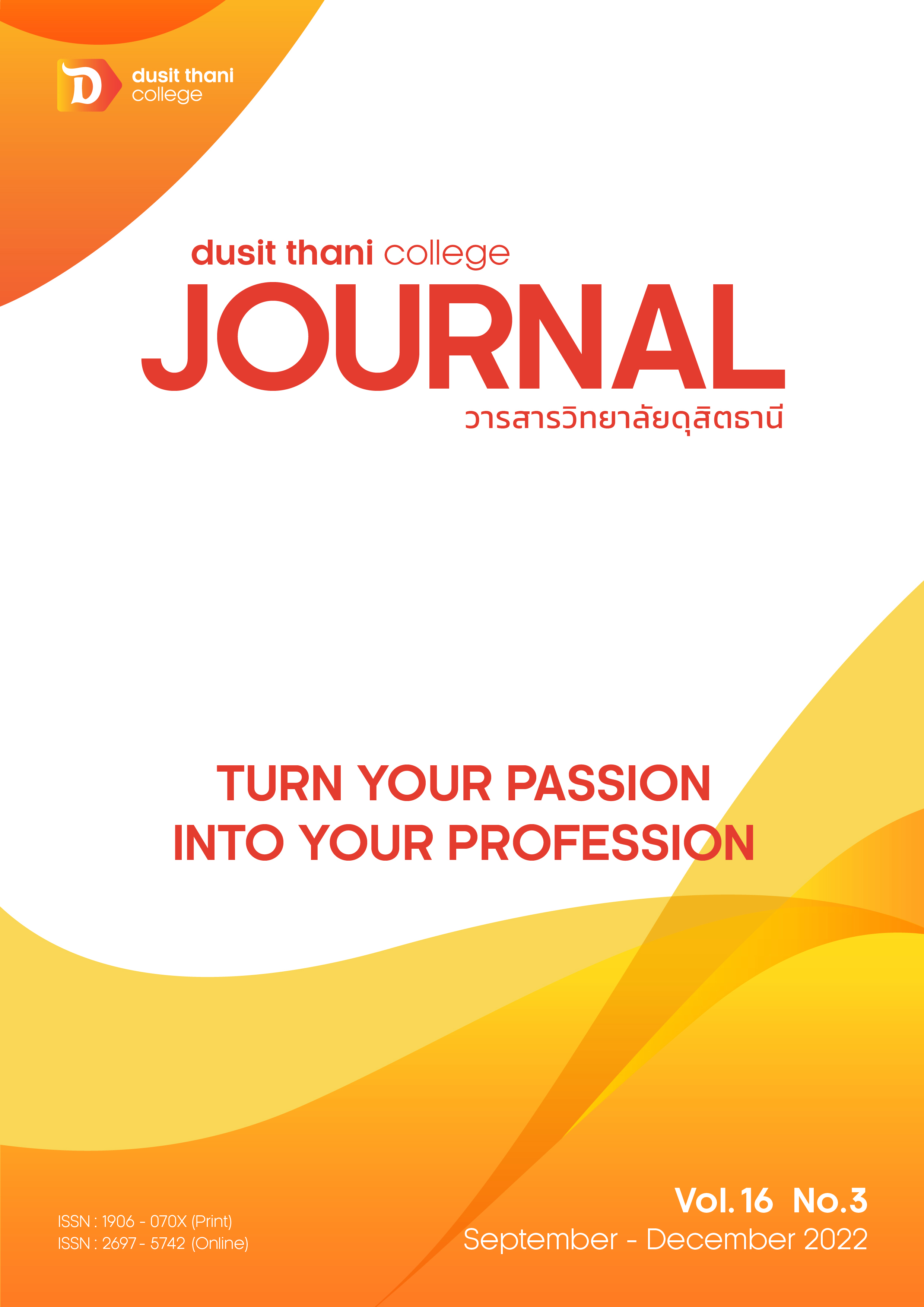An Analytical of Tourist Behavior Marketing Mix and Online Marketing Efficiency to Support Holistic Smart City Tourism in Phuket.
Main Article Content
Abstract
This research study has the objectives of 1) to study the characteristics of demographic data tourist behavior marketing mix and efficiency of online marketing in Phuket 2) to analyze the relationship between Demographic characteristics and behavior of tourists in the smart tourism city of Phuket 3) to analyze the difference between demographic characteristics and marketing mix (7P's) in tourist attractions in Phuket and 4) to analyze differences between Demographic Characteristics and Online Tourism Marketing (4C's) of Tourist Attractions in Phuket is a quantitative research Use the questionnaire as a tool Collected data from 400 tourists traveling in Phuket. Data were analyzed with statistical software packages. and test the hypothesis by chi-square statistics, T-test and F-test.
The results showed that Most of the personal data of the tourists are female, aged between 18-24 years old, bachelor's degree, Occupation Student/student, single, earning no more than 15,000 baht and domiciled in the central region. The tourism behavior of tourists in Phuket. There is a nature of traveling with family to relax, receive news information through online channels, Facebook by interested in viewing reviews of places that focus on posting photos as for online activities, it will be searching for information such as tourist attractions, accommodation, restaurants, etc. On the marketing mix, tourists pay attention to the products, marketing channel and physical characteristics of tourist attractions and factors in online marketing, tourists give their opinions on how to respond to the needs of consumers and convenience in traveling.
Article Details

This work is licensed under a Creative Commons Attribution-NonCommercial-NoDerivatives 4.0 International License.
Article Screening Policy
- All research and academic articles to be published must be considered and screened by three peer reviews in the relevant field / article.
- All articles, texts, illustrations and tables published in the journal are the personal opinions of the authors. Editors don't always have to agree. And no responsibility whatsoever is the sole responsibility of the author.
- The articles to be published must never be published. Where did you first publish? And not in the consideration of other journals If the audit found that there has been a duplicate publication It is the sole responsibility of the author.
- Any article that the reader sees as being plagiarized or impersonated without reference. Or mislead the work of the author Please let the journal editor know it will be your greatest blessing.
References
Anindra, F., Supangkat, S. H., & Kosala, R. R. (2019). Smart governance as smart city critical success factor (case in 15 cities in Indonesia). In International Conference on ICT for Smart Society (ICISS) 2018 (pp. 1-6). West Java.
Angsakul, J. (2012). Design and development of intelligent agents for the Thai tourism industry. Suranaree University of Technology: Nakhon Ratchasima.
Armstrong and Kotler, P. (2009). Marketing, an introduction (9 th ed.). New Jersey: Pearson Prentice Hall.
Boonyaphak, W. (2007). Tourism Resources of Thailand. Teaching documents of Thai Tourism Resources Program in Management Science Sukhothai Thammathirat Open University, Sukhothai Thammathirat Open University. Nonthaburi. Business Research Division 1, Business Research Department. (2016). Collected from overseas world tourism trends in 2016. EMIM E-News March 2016. Export-Import Bank of Thailand. Bangkok.
Getachew Bulti, A., Ray, A. and Bhuyan. P. (2019). Smart Tourism System. Retrieved June 10, 2020 from ้https://www.researchgate.net/publication/333672862
Gozdegul Baser and Oğuz Doğan. (2019). Smart tourism Destination in Smart Cities Paradigm: A model for Antalya. Retrieved June 10, 2020 from https://www.researchgate.net/publication/331037999
Guerra, I., et al. (2017). Smart Cities, Smart Tourism: The Case of The City of Porto. Retrieved June 10, 2020 from https://core.ac.uk/download/pdf/216336149.pdf
Kamchina, C. (2019). Integration of information technology to develop a smart city model. Case study of the core city municipal area. Chiang Mai Province. Chiang Mai Rajabhat University
Kotler, P. (1997). Marketing management: analysis, planning implementation and control. (9th ed). New Jersey: Asimmon &Schuster.
Maesincee, S. (2016). Thailand 4.0 Marketing. Retrieved June 10, 2020 from
http://planning2.mju.ac.th/goverment/20111119104835_planning/Doc_25590823143652_358135.pdf
Ministry of Digital Economy and Society. (2019). Government Action Plan, 4 years, 2019 – 2022, Ministry of Digital Economy and Society. Bangkok.
Nuntarapong, A. and Wetprasit, R. (2016). "Methods to measure the impact of design patterns on software maintainability". MAEJO INTERNATIONAL JOURNAL OF SCIENCE AND TECHNOLOGY, 12 (3) : 251-271
Office of the National Economic and Social Development Board. (2017). National Economic and Social Development Plan, Vol. 12 (2017-2021). Prime Minister's Office Bangkok.
Office of the National Economic and Social Development Board. (2018). Report on situation analysis of poverty and inequality in Thailand 2017. Office of the National Economic and Social Development Board.
Ongluam, S. (2014). Documents for teaching tourist behavior. Faculty of Humanities Chiang Mai University. Chiang Mai.
Phuket Provincial Tourism and Sports Office. (2021). Phuket Tourism Strategic Plan Year 2018-2021. Phuket Province
Sajid Khan, M. et al. (2019). Smart City and Smart Tourism: A case of Dubai. Retrieved June 10, 2020 from https://www.researchgate.net/publication/321694768
Sereerat, S. et al. (2009). Marketing mix. Retrieved June 10, 2020 from http://spssthesis.blogspot.com/
Smart City Thailand Office. (Digital Economy Promotion Agency). (2020). The definition of a smart city. Retrieved June 10, 2020, from https://smartcitythailand.or.th/
Tourism Authority of Thailand. (2018). Smart City, Smart Citizen, Smart Tourism. Bangkok. Retrieved 10 June 2020, from https://www.tatreviewmagazine.com/article/smart-city-smart-citizen-smart-tourism/
Tourism Authority of Thailand. (2018). Tourism smart data: Big data and tourism. Retrieved June 10, 2020, from https://www.tatreviewmagazine.com/article/tourism-smart-data-big-data/
Yanopas, N. (2019). Innovation of tourism in the digital age. academic journal Kanchanaburi Rajabhat University, 7(2), 1-8.


